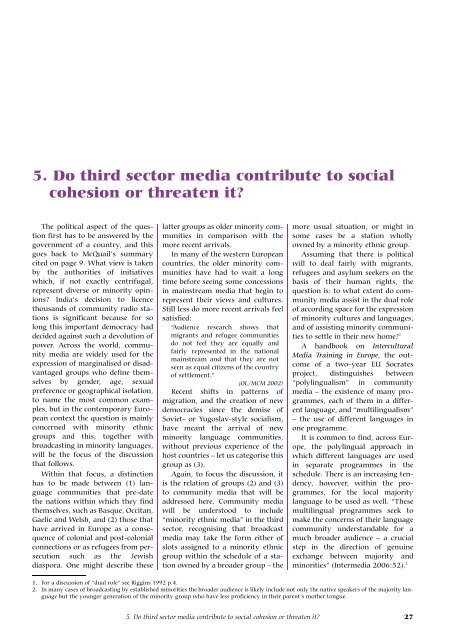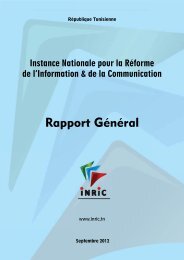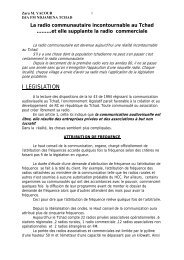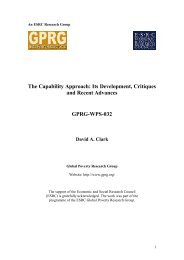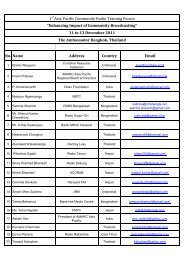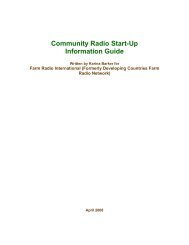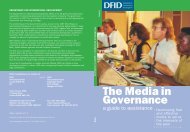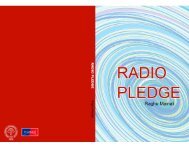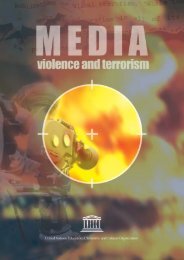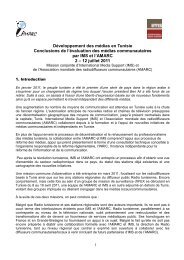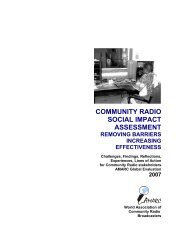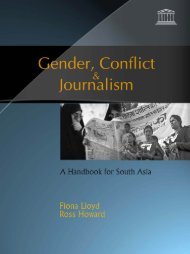Promoting social cohesion: the role of community media - amarc
Promoting social cohesion: the role of community media - amarc
Promoting social cohesion: the role of community media - amarc
- No tags were found...
You also want an ePaper? Increase the reach of your titles
YUMPU automatically turns print PDFs into web optimized ePapers that Google loves.
5. Do third sector <strong>media</strong> contribute to <strong>social</strong><strong>cohesion</strong> or threaten it?The political aspect <strong>of</strong> <strong>the</strong> questionfirst has to be answered by <strong>the</strong>government <strong>of</strong> a country, and thisgoes back to McQuail’s summarycited on page 9. What view is takenby <strong>the</strong> authorities <strong>of</strong> initiativeswhich, if not exactly centrifugal,represent diverse or minority opinions?India’s decision to licencethousands <strong>of</strong> <strong>community</strong> radio stationsis significant because for solong this important democracy haddecided against such a devolution <strong>of</strong>power. Across <strong>the</strong> world, <strong>community</strong><strong>media</strong> are widely used for <strong>the</strong>expression <strong>of</strong> marginalised or disadvantagedgroups who define <strong>the</strong>mselvesby gender, age, sexualpreference or geographical isolation,to name <strong>the</strong> most common examples,but in <strong>the</strong> contemporary Europeancontext <strong>the</strong> question is mainlyconcerned with minority ethnicgroups and this, toge<strong>the</strong>r withbroadcasting in minority languages,will be <strong>the</strong> focus <strong>of</strong> <strong>the</strong> discussionthat follows.Within that focus, a distinctionhas to be made between (1) languagecommunities that pre-date<strong>the</strong> nations within which <strong>the</strong>y find<strong>the</strong>mselves, such as Basque, Occitan,Gaelic and Welsh, and (2) those thathave arrived in Europe as a consequence<strong>of</strong> colonial and post-colonialconnections or as refugees from persecutionsuch as <strong>the</strong> Jewishdiaspora. One might describe <strong>the</strong>selatter groups as older minority communitiesin comparison with <strong>the</strong>more recent arrivals.In many <strong>of</strong> <strong>the</strong> western Europeancountries, <strong>the</strong> older minority communitieshave had to wait a longtime before seeing some concessionsin mainstream <strong>media</strong> that begin torepresent <strong>the</strong>ir views and cultures.Still less do more recent arrivals feelsatisfied:“Audience research shows thatmigrants and refugee communitiesdo not feel <strong>the</strong>y are equally andfairly represented in <strong>the</strong> nationalmainstream and that <strong>the</strong>y are notseen as equal citizens <strong>of</strong> <strong>the</strong> country<strong>of</strong> settlement.”(OL/MCM 2002)Recent shifts in patterns <strong>of</strong>migration, and <strong>the</strong> creation <strong>of</strong> newdemocracies since <strong>the</strong> demise <strong>of</strong>Soviet- or Yugoslav-style <strong>social</strong>ism,have meant <strong>the</strong> arrival <strong>of</strong> newminority language communities,without previous experience <strong>of</strong> <strong>the</strong>host countries – let us categorise thisgroup as (3).Again, to focus <strong>the</strong> discussion, itis <strong>the</strong> relation <strong>of</strong> groups (2) and (3)to <strong>community</strong> <strong>media</strong> that will beaddressed here. Community <strong>media</strong>will be understood to include“minority ethnic <strong>media</strong>” in <strong>the</strong> thirdsector, recognising that broadcast<strong>media</strong> may take <strong>the</strong> form ei<strong>the</strong>r <strong>of</strong>slots assigned to a minority ethnicgroup within <strong>the</strong> schedule <strong>of</strong> a stationowned by a broader group – <strong>the</strong>more usual situation, or might insome cases be a station whollyowned by a minority ethnic group.Assuming that <strong>the</strong>re is politicalwill to deal fairly with migrants,refugees and asylum seekers on <strong>the</strong>basis <strong>of</strong> <strong>the</strong>ir human rights, <strong>the</strong>question is: to what extent do <strong>community</strong><strong>media</strong> assist in <strong>the</strong> dual <strong>role</strong><strong>of</strong> according space for <strong>the</strong> expression<strong>of</strong> minority cultures and languages,and <strong>of</strong> assisting minority communitiesto settle in <strong>the</strong>ir new home? 1A handbook on InterculturalMedia Training in Europe, <strong>the</strong> outcome<strong>of</strong> a two-year EU Socratesproject, distinguishes between“polylingualism” in <strong>community</strong><strong>media</strong> – <strong>the</strong> existence <strong>of</strong> many programmes,each <strong>of</strong> <strong>the</strong>m in a differentlanguage, and “multilingualism”– <strong>the</strong> use <strong>of</strong> different languages inone programme.It is common to find, across Europe,<strong>the</strong> polylingual approach inwhich different languages are usedin separate programmes in <strong>the</strong>schedule. There is an increasing tendency,however, within <strong>the</strong> programmes,for <strong>the</strong> local majoritylanguage to be used as well. “Thesemultilingual programmes seek tomake <strong>the</strong> concerns <strong>of</strong> <strong>the</strong>ir language<strong>community</strong> understandable for amuch broader audience – a crucialstep in <strong>the</strong> direction <strong>of</strong> genuineexchange between majority andminorities” (Inter<strong>media</strong> 2006:52). 21. For a discussion <strong>of</strong> “dual <strong>role</strong>” see Riggins 1992 p.4.2. In many cases <strong>of</strong> broadcasting by established minorities <strong>the</strong> broader audience is likely include not only <strong>the</strong> native speakers <strong>of</strong> <strong>the</strong> majority languagebut <strong>the</strong> younger generation <strong>of</strong> <strong>the</strong> minority group who have less pr<strong>of</strong>iciency in <strong>the</strong>ir parent’s mo<strong>the</strong>r tongue.5. Do third sector <strong>media</strong> contribute to <strong>social</strong> <strong>cohesion</strong> or threaten it? 27


